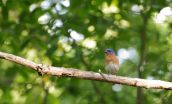Chapman University research on meat species shows mislabeling in commercial products
Researchers in Chapman University's Food Science Program have just published 2 separate studies on meat mislabeling in consumer commercial products
2015-08-21
(Press-News.org) ORANGE, Calif. - Researchers in Chapman University's Food Science Program have just published two separate studies on meat mislabeling in consumer commercial products. One study focused on identification of species found in ground meat products, and the other focused on game meat species labeling. Both studies examined products sold in the U.S. commercial market; and both study outcomes identified species mislabeling among the product samples.
In the study on identification of species found in ground meat products, 48 samples were analyzed and 10 were found to be mislabeled. Of those 10, nine were found to have additional meat species and one sample was mislabeled in its entirety. Additionally, horsemeat, which is illegal to sell in the United States, was detected in two of the samples.
"Although extensive meat species testing has been carried out in Europe in light of the 2013 horsemeat scandal, there has been limited research carried out on this topic in the United States," said Rosalee Hellberg, Ph.D., assistant professor at Chapman University and co-author on both studies. "To our knowledge, the most recent U.S. meat survey was published in 1995."
A total of 48 fresh and frozen ground meat products representing a variety of species were collected for the research and tested using a combination of DNA barcoding and real-time polymerase chain reaction (PCR). The study speculates that the presence of multiple species commonly found in ground meats suggests the possibility of cross-contamination at the processing facility. Unintentional mislabeling may occur when several species are ground on the same manufacturing equipment, without proper cleaning in between samples. Another trend observed in the study indicates the possibility of lower-cost species being intentionally mixed in with higher-cost species for economic gain.
Overall, mislabeling was found to be most common in products purchased from online specialty meat distributors (versus supermarkets), which showed a 35 percent rate of mislabeling and included products labeled as black bear and yak burgers.
The second study, focusing on game meat species labeling, used a total of 54 game meat products collected from online retail sources in the United States. Of these 54 samples, a total of 22 different types of game meat were represented based on the product label. Like the previous study, the samples were tested using DNA barcoding.
The results showed 10 products to be potentially mislabeled. Two products labeled as bison and one labeled as yak were identified as domestic cattle. Other mislabeling included a product labeled as black bear that was identified as American beaver, and a product labeled as pheasant that was identified as helmeted guineafowl.
Additionally, there were also five products identified as a near threatened (bison) or threatened (lion) species and these were all determined to be correctly labeled and legally sold.
Game meats represent an important specialty market in the United States with an estimate value of $39 billion. According to the U.S. Food and Drug Administration (FDA), game meats are defined as exotic meats, animals and birds, which are not in the Meat and Poultry Act. Game meats produced in the United States are regulated by the U.S. Department of Agriculture, while game meats imported into the U.S. are regulated by the FDA.
Both studies were published in the journal Food Control.
INFORMATION:
Consistently ranked among the top universities in the West, Chapman University provides a uniquely personalized and interdisciplinary educational experience to highly qualified students. Our programs encourage innovation, creativity and collaboration, and focus on developing global citizen-leaders who are distinctively prepared to improve their community and their world. Visit http://www.chapman.edu
Follow us on Facebook at: Chapman University Facebook
On Twitter at: @ChapmanU
On YouTube at: Chapman University YouTube Channel
ELSE PRESS RELEASES FROM THIS DATE:
2015-08-21
Los Angeles, CA (August 21, 2015) With the globalization of biomedical research and growing concerns about possible pandemics of diseases such as HIV, SARS, and Ebola, international data-sharing practices are of growing interest to the biomedical science community. But what are the advantages and disadvantages of sharing data in low and middle-income settings? What challenges stand in the way for researchers in countries such as India, Kenya, and Vietnam? A new special issue of SAGE's Journal of Empirical Research on Human Research Ethics (JERHRE) presents guidelines, protocols, ...
2015-08-21
Birds 'shout' to be heard over the noise produced by man-made activity, new research has shown.
The innovative study, led by an expert from the University of Exeter, looked at how bluebirds altered their songs in response to increases in nearby background noise caused, in many cases, by human activities such as traffic.
It found that the birds altered their songs immediately after noise levels intensified, making 'real-time' adjustments in order to produce songs that are both louder and lower-pitched. The results suggest that birds are able to perceive increases in ...
2015-08-21
Chestnut Hill, MA (Aug. 21, 2015) - A fresh look at some old rocks has solved a crucial mystery of the last Ice Age, yielding an important new finding that connects to the global retreat of glaciers caused by climate change today, according to a new study by a team of climate scientists.
For decades, researchers examining the glacial meltdown that ended 11,000 years ago took into account a number of contributing factors, particularly regional influences such as solar radiation, ice sheets and ocean currents.
But a reexamination of more than 1,000 previously studied ...
2015-08-21
CHICAGO -- Each year, 311 -- New York City's main hub for government information and non-emergency services -- receives millions of requests and complaints, including New Yorkers' gripes about their neighbors.
In a new study from New York University (NYU) using 311 complaint data, researchers tracked when and where New Yorkers complain about their neighbors making noise, blocking driveways, or drinking in public. They found that these complaints -- a defining aspect of urban life -- are more likely to occur in areas sandwiched between two homogenous communities, where ...
2015-08-21
A former adviser to the US Secretary of State says that genetic modification (GM) is the most critical technology in agriculture for meeting the challenges of feeding a growing global population, writing in the open access journal Agriculture & Food Security.
Nina Fedoroff, molecular biologist and former Science and Technology Adviser to Hillary Clinton and Condoleezza Rice, warns of the detrimental influence of politics and misinformation on the safety of GM crops. Instead, Fedoroff says that: "GM crops are arguably the safest new crops ever introduced into the human ...
2015-08-21
The fact that the greatest diversity of large mammals is found in Africa reflects past human activities - and not climatic or other environmental constraints. This is determined in a new study, which presents what the world map of mammals would look like if modern man (Homo sapiens) had never existed.
In a world without humans, most of northern Europe would probably now be home to not only wolves, Eurasian elk (moose) and bears, but also animals such as elephants and rhinoceroses.
This is demonstrated in a new study conducted by researchers from Aarhus University, Denmark. ...
2015-08-21
In a new study published today in the Journal of Health Psychology, researchers from the University of Surrey have found dieters who eat 'on the go' may increase their food intake later in the day which could lead to weight gain and obesity. The findings from the study also showed that eating while walking around triggered more overeating compared to eating during other forms of distraction such as watching TV or having a conversation with a friend.
The team examined 60 females who were either dieters or non-dieters and gave them all a cereal bar to eat under three different ...
2015-08-21
A "substantial" proportion of NHS hospital staff--around one in eight, in some places--treat the victims of people trafficking, with maternity services most likely to do so, finds research published in the online journal BMJ Open.
Although understanding of the sorts of health problems trafficked patients are likely to have, is generally high, few NHS staff feel adequately prepared to respond appropriately, the findings suggest.
International law requires that the UK provides victims of human trafficking with whatever medical treatment they require, which includes psychological ...
2015-08-21
Nine potentially modifiable risk factors may contribute to up to two thirds of Alzheimer's disease cases worldwide, suggests an analysis of the available evidence, published online in the Journal of Neurology Neurosurgery & Psychiatry.
The analysis indicates the complexity of Alzheimer's disease development and just how varied the risk factors for it are.
But the researchers suggest that preventive strategies, targeting diet, drugs, body chemistry, mental health, pre-existing disease, and lifestyle may help to stave off dementia. This could be particularly important, ...
2015-08-21
In a Policy View published in The Lancet Neurology journal, a group of leading experts on the epidemiology of dementia state that the number of people with dementia - both new cases and total numbers with the disease - in some Western European countries is stabilising despite population ageing, in direct contrast to the "dementia epidemic" reported in some recent studies.
The Policy View discusses data from five large epidemiological studies done in Sweden, the Netherlands, the UK, and Spain that compare dementia occurrence in old people across two periods of time using ...
LAST 30 PRESS RELEASES:
[Press-News.org] Chapman University research on meat species shows mislabeling in commercial products
Researchers in Chapman University's Food Science Program have just published 2 separate studies on meat mislabeling in consumer commercial products


